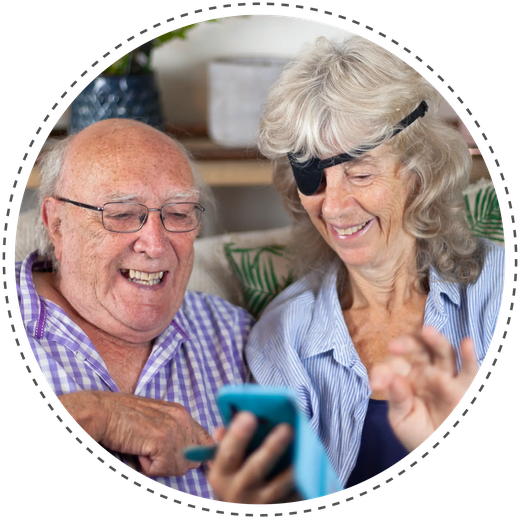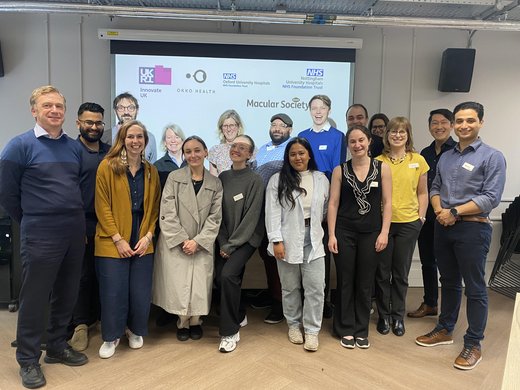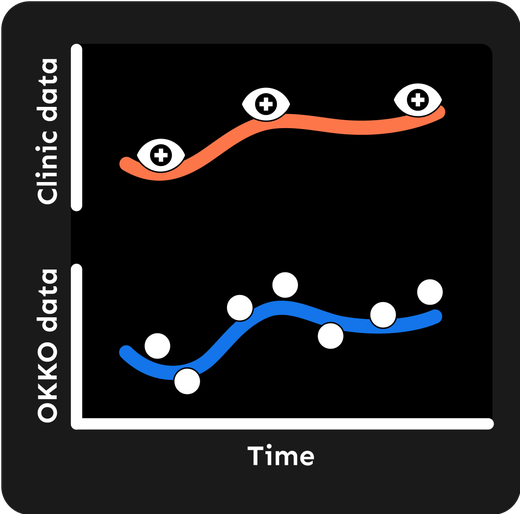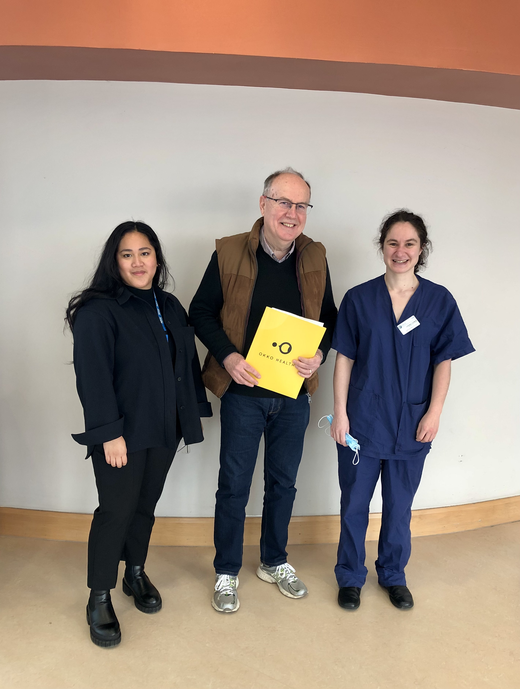OKKO Health’s home-monitoring project with Oxford and Nottingham Hospitals and Macular Society

OKKO Health has been collaborating in a flagship Innovate UK project with Nottingham and Oxford University hospitals and the Macular Society. The aim is to develop an algorithm for the early detection of visual deterioration in-between appointments for patients with AMD. Many of you reading this will be taking part, so thank you!
The project is also exploring the possibilities of home-monitoring and how this can be established into standard clinical practice, to drive improved patient care as well as optimising the use of in-person appointments. Professor Alexander Foss, one of the Principal Investigators from the University of Nottingham explains; ‘The NHS has a 25% shortage of specialist eye doctors, leading to significant waiting lists and backlogs. Smartphone apps have the potential to measure standard metrics of visual function, which can be done outside the clinic.’
This study has the potential to help thousands of individuals living with AMD, and we are really excited to continue our work with OKKO in our journey to beat macular disease.
Sarah Jarman,
Head of Partnerships,
Macular Society

Image 1: The project team, including members from Nottingham and Oxford hospitals, Macular Society and OKKO Health, meets in person regularly to discuss study results and plan next steps.
The project, being conducted at Nottingham and Oxford University Hospitals, captures more data than traditional vision monitoring methods, including data on patient experience and symptoms, to develop an algorithm that will influence a more personal approach to eye care.
OKKO will use this data, combined with clinical measurements and scans, to develop an algorithm which aims to identify sight problems between appointments at the earliest possible opportunity, allowing for patients to be fast-tracked to the clinic when needed.

It is exciting to be involved in an innovative project which not only explores the potential of this app to monitor vision, but also to develop a resource for patients to access relevant information about their eye condition.
Prof. Susan Downes,
Principal Investigator,
University of Oxford
The project has seen more than 350 participants regularly playing the app from home, supported by their clinicians and the OKKO Health staff. Participants have been asked to play the app on their device at home three times per week and attend the eye clinic as usual for their appointments. This allows OKKO to compare the scores from the games to the measurements taken in the clinic. The app consists of two games, one to measure visual acuity and the other to measure visual distortion. Visual acuity refers to the ability to be able to see fine detail, usually measured using a standard eye chart. Distortion refers to the distorted vision commonly experienced by people with macular disease, where straight lines may appear wavy.
Data from both games is collected by OKKO and users are presented with a graph of their results at the end of the week. This has resulted in over 40,000 game sessions having been played over the study period so far, which started in February 2023. OKKO are aiming to reach over 60,000 sessions, which will give them a large amount of vital data on the long-term monitoring of vision in individuals with AMD. OKKO’s initial analytics have shown:
The more you play, the more accurate the app becomes at measuring vision.
As an example, this illustration (Figure 1) shows the measurements taken in the clinic (top half) and the measurements from the OKKO Health app (bottom half). Early results indicate that the OKKO Health app can measure changes in your vision in line with changes measured in the clinic, but the project will continue to explore accuracy and reliability over time.

Figure 1: An illustration to show visual acuity measured by the app and in the clinic over time.
OKKO has also pulled together a Patient Advisory Board which will meet quarterly to ensure that patient voices are heard in how their data is used. Outcomes of these meetings will be shared in future articles.

Image 2: The first recruited study participant at Oxford Hospital, Robert Williamson (in the middle), together with Research Practitioners Queen Pilapil (to the left) and Louise Cowen (to the right).
Participating in this study is a win win. I am helping to develop a tool that hopefully will aid AMD management in the future, whilst I am feeling more involved and empowered in managing my treatment and eye health.
Study Participant
A recent survey sent to study participants showed that the majority of people are taking part in the study to help improve the experience of eye care for patients, to contribute to research and to be proactive in their eye care journey. One participant said: ‘I am hoping that monitoring of AMD at home will become part of the normal treatment routine. It feels helpful to be able to monitor your own vision and gives a sense of having a role in your own healthcare needs’.
In the coming months, OKKO Health is planning to hold live webinars (virtual presentations) during which insights and findings from the project will be shared. More information about these to follow in future updates.
A note from OKKO to the participants
Thank you to those who responded to the survey! It has given us great insights into the usability of the app and we are grateful for your suggestions of improvements to the product. For example, in the symptom tracker function, you told us that the questions didn’t seem applicable, so we are working with the macular society to improve these and make them more relevant. Furthermore, you told us you would like to see more of your data over a longer time period. We are excited to improve this app together with your feedback, but these items will take our research and development team some time, so please bear with us! We were pleased to see that the majority of you found the app easy to use and many commented on how quickly the tests can be completed. Without your continued support in playing the games and providing valuable feedback, we would not be able to achieve this, so thank you!
Thank you so very much for your participation, we are so grateful for your effort and your commitment to this important work. By playing these vision puzzle games three times weekly, we stand the best chance of creating an early detection algorithm.
Dr Stephanie Campbell, Founder and CEO at OKKO Health
If you have any questions or feedback on the OKKO Health app, email support@okkohealth.com.